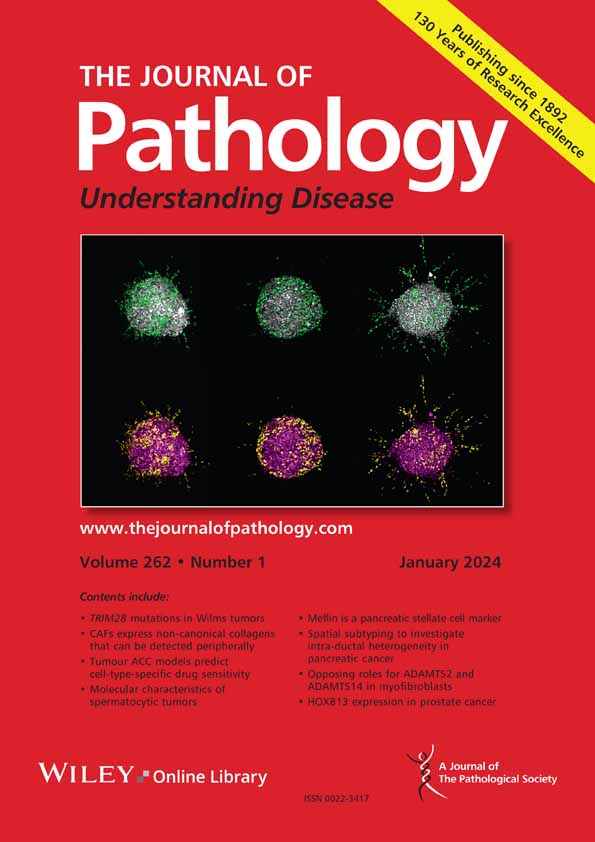John M Fenimore, Danielle A Springer, Maria E Romero, Elijah F Edmondson, Dan W McVicar, Sudhirkumar Yanpallewar, Michael Sanford, Thea Spindel, Elizabeth Engle, Thomas J Meyer, Julio C Valencia, Howard A Young
下载PDF
{"title":"IFN-γ和雄激素破坏小鼠肌细胞的线粒体功能","authors":"John M Fenimore, Danielle A Springer, Maria E Romero, Elijah F Edmondson, Dan W McVicar, Sudhirkumar Yanpallewar, Michael Sanford, Thea Spindel, Elizabeth Engle, Thomas J Meyer, Julio C Valencia, Howard A Young","doi":"10.1002/path.6081","DOIUrl":null,"url":null,"abstract":"<p>The effect of cytokines on non-traditional immunological targets under conditions of chronic inflammation is an ongoing subject of study. Fatigue is a symptom often associated with autoimmune diseases. Chronic inflammatory response and activated cell-mediated immunity are associated with cardiovascular myopathies which can be driven by muscle weakness and fatigue. Thus, we hypothesize that immune dysfunction-driven changes in myocyte mitochondria may play a critical role in fatigue-related pathogenesis. We show that persistent low-level expression of IFN-γ in designated IFN-γ AU-Rich Element deletion mice (ARE mice) under androgen exposure resulted in mitochondrial and metabolic deficiencies in myocytes from male or castrated ARE mice. Most notably, echocardiography unveiled that low ejection fraction in the left ventricle post-stress correlated with mitochondrial deficiencies, explaining how heart function decreases under stress. We report that inefficiencies and structural changes in mitochondria, with changes to expression of mitochondrial genes, are linked to male-biased fatigue and acute cardiomyopathy under stress. Our work highlights how male androgen hormone backgrounds and active autoimmunity reduce mitochondrial function and the ability to cope with stress and how pharmacological blockade of stress signal protects heart function. These studies provide new insight into the diverse actions of IFN-γ in fatigue, energy metabolism, and autoimmunity. © 2023 The Pathological Society of Great Britain and Ireland. This article has been contributed to by U.S. Government employees and their work is in the public domain in the USA.</p>","PeriodicalId":232,"journal":{"name":"The Journal of Pathology","volume":"260 3","pages":"276-288"},"PeriodicalIF":5.6000,"publicationDate":"2023-04-27","publicationTypes":"Journal Article","fieldsOfStudy":null,"isOpenAccess":false,"openAccessPdf":"https://pathsocjournals.onlinelibrary.wiley.com/doi/epdf/10.1002/path.6081","citationCount":"1","resultStr":"{\"title\":\"IFN-γ and androgens disrupt mitochondrial function in murine myocytes\",\"authors\":\"John M Fenimore, Danielle A Springer, Maria E Romero, Elijah F Edmondson, Dan W McVicar, Sudhirkumar Yanpallewar, Michael Sanford, Thea Spindel, Elizabeth Engle, Thomas J Meyer, Julio C Valencia, Howard A Young\",\"doi\":\"10.1002/path.6081\",\"DOIUrl\":null,\"url\":null,\"abstract\":\"<p>The effect of cytokines on non-traditional immunological targets under conditions of chronic inflammation is an ongoing subject of study. Fatigue is a symptom often associated with autoimmune diseases. Chronic inflammatory response and activated cell-mediated immunity are associated with cardiovascular myopathies which can be driven by muscle weakness and fatigue. Thus, we hypothesize that immune dysfunction-driven changes in myocyte mitochondria may play a critical role in fatigue-related pathogenesis. We show that persistent low-level expression of IFN-γ in designated IFN-γ AU-Rich Element deletion mice (ARE mice) under androgen exposure resulted in mitochondrial and metabolic deficiencies in myocytes from male or castrated ARE mice. Most notably, echocardiography unveiled that low ejection fraction in the left ventricle post-stress correlated with mitochondrial deficiencies, explaining how heart function decreases under stress. We report that inefficiencies and structural changes in mitochondria, with changes to expression of mitochondrial genes, are linked to male-biased fatigue and acute cardiomyopathy under stress. Our work highlights how male androgen hormone backgrounds and active autoimmunity reduce mitochondrial function and the ability to cope with stress and how pharmacological blockade of stress signal protects heart function. These studies provide new insight into the diverse actions of IFN-γ in fatigue, energy metabolism, and autoimmunity. © 2023 The Pathological Society of Great Britain and Ireland. This article has been contributed to by U.S. Government employees and their work is in the public domain in the USA.</p>\",\"PeriodicalId\":232,\"journal\":{\"name\":\"The Journal of Pathology\",\"volume\":\"260 3\",\"pages\":\"276-288\"},\"PeriodicalIF\":5.6000,\"publicationDate\":\"2023-04-27\",\"publicationTypes\":\"Journal Article\",\"fieldsOfStudy\":null,\"isOpenAccess\":false,\"openAccessPdf\":\"https://pathsocjournals.onlinelibrary.wiley.com/doi/epdf/10.1002/path.6081\",\"citationCount\":\"1\",\"resultStr\":null,\"platform\":\"Semanticscholar\",\"paperid\":null,\"PeriodicalName\":\"The Journal of Pathology\",\"FirstCategoryId\":\"3\",\"ListUrlMain\":\"https://onlinelibrary.wiley.com/doi/10.1002/path.6081\",\"RegionNum\":2,\"RegionCategory\":\"医学\",\"ArticlePicture\":[],\"TitleCN\":null,\"AbstractTextCN\":null,\"PMCID\":null,\"EPubDate\":\"\",\"PubModel\":\"\",\"JCR\":\"Q1\",\"JCRName\":\"ONCOLOGY\",\"Score\":null,\"Total\":0}","platform":"Semanticscholar","paperid":null,"PeriodicalName":"The Journal of Pathology","FirstCategoryId":"3","ListUrlMain":"https://onlinelibrary.wiley.com/doi/10.1002/path.6081","RegionNum":2,"RegionCategory":"医学","ArticlePicture":[],"TitleCN":null,"AbstractTextCN":null,"PMCID":null,"EPubDate":"","PubModel":"","JCR":"Q1","JCRName":"ONCOLOGY","Score":null,"Total":0}
引用次数: 1
引用
批量引用

 求助内容:
求助内容: 应助结果提醒方式:
应助结果提醒方式:


